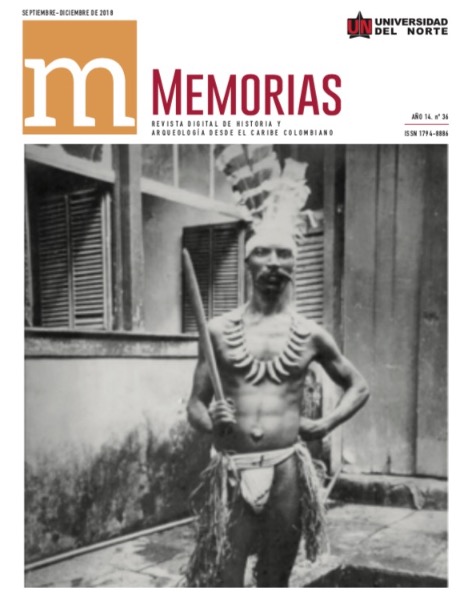Abstract
Obeah encompasses a wide variety of beliefs and practices that involve the control and channeling of supernatural and spiritual forces, usually for social benefit, in extreme cases can treat diseases, bring good fortune, protect against harm and avenge against evils. Obeah was used to pressure the Europeans during the period of slavery a more positive role in the slaves In colonial times, colonial officials, local white elites and their ideological allies exaggerated Obeah's antisocial dimensions, minimizing or ignoring their Positive functions. This negative interpretation many accept it to varying degrees although the positive attributes of Obeah are still recognized in most parts of the English-speaking Caribbean. Obeah incorporates two basic categories of practice: good and bad magic as well as healing practices based on using elements of the natural world. Obeah was part of the displaced Africans who could count on healing and protection. Obeah is a client-practitioner relationship, with the affected subject seeking the help of the Obeah man or woman on an individual basis.
References
Akan origin of the term hoodoo. (s.f.). Recuperado de http://www.odwirafo.com/Akan_Origin_of_the_Term_Hoodoo.pdf.
Amodio, E. (2009). Las cortes históricas en el culto a María Lionza en Venezuela. Construcción del pasado y mitologías de los héroes. Revista Venezolana de Economía y Ciencias Sociales, 15 (3).
Anderson, J. (s.f.) Hoodoo, Voodoo, and Conjure. E.U.A.: Greenwood Press.
Bare “Bones” Basics of Obeah. (s. f.). Recuperado de http://doctorhawk.blogspot.mx/2014/09/bare-bones-basics-of-obeah.html
Basil, H. (s. f.). Obeah: Black and White magic in the Bahamas. Recuperado de http://ilacadofsci.com/wp-content/uploads/2013/09/073-35-print.pd.
Bilby, K. & Handler, J.S. (2004). Obeah: Healing and Protection in West Indian Slave Life. The Journal of Caribbean History, 38(2), 153-183.
Bisnauth, D. (1989). History of Religions in the Caribbean. Reino Unido: Kingston Publishers.
Cassidy, F. (1985). Dictionary of Jamaican English. Cambridge Reino Unido: Cambridge University Press.
Concepción, F. (2013). Myalismo y obeah: sincretismo y Poder. Revista Transdiciplinaria Metro Inter.Kálathos, 6 (2).
De Mattos, N. (2013). Obeah: A Sorcerous Ossuary. E.U.A.: Hadean Press. Ebook Scribid® Encyclopedia of African Religion. (2009). E.U.A.: SAGE.
Fernández, M. & Paravisini–Gebert, L. (2003). Creole Religions of the Caribbean: An Introduction from Vodou and Santería to Obeah and Espiritismo. E.U.A.: New York University Press.
Guevara, N. (2006). Self-determination is not a sin; it is a human right, a God given right: Autonomismo y religión bautista en San Andrés Isla. Memorias Revista digital de Historia y Arqueología desde el Caribe, 3(5).
Hanserd, R. (s. f.). Obayifo to obeah: priestly power and other elements of afroatlantic akan identity. American Historical Association. Recuperado de https://stanfordfas.files.wordpress.com/2011/10/hanserd_sfas20111.pdf.
Hendrick, B. (s.f.) Obeah: Black and White magic in the Bahamas. Recuperado de http://ilacadofsci.com/wp-content/uploads/2013/09/073-35-print.pdf
Holland, C. (2011). Programa Latinoamericano de Estudios Sociorreligiosos. Encyclopedia of Religious Groups in Latin America and the Caribbean: Religion in Belize. Costa Rica. Recuperado de http://www.prolades.com/historiografia/1-Belice/religion-belize-09.pdf.
James, D. (2011) An Investigation of the Impact of Amerindian Mythology on Trinidad and Tobago’s Forest Folklore. History in Action, 2 (2), 1-6.
Johnson M. & Moore, B.L. (2010). Neither Led Nor Driven: Contesting British Cultural Imperialism in Jamaica 1865-1920. Jamaica: University of the West Indies Press.
Majeed, H. (2016). God and the demon in cartesian and akan philosophies: a comparative analysis. Ilorin Journal of Religious studies, 6(2), 75-90.
Martínez Montiel, L. M. (s .f.). Las religiones caribeñas. En El exilio de los dioses. Religiones afrohispanas (pp. 75-83). Recuperado de http://www.larramendi.es/i18n/catalogo_imagenes/grupo.cmd?path=1000205
Michele A. J. & Brian, L. M. (2010). Neither Led Nor Driven: Contesting British Cultural Imperialism in Jamaica 1865-1920. Jamaica: University of the West Indies Press.
Novich, H. (s. f.). Religiones tradicionales africanas. Recuperado de http://www.cienciadelespiritu.org/wp-content/uploads/2013/11/49b-Religiones-tradicionales-africanas.pdf.
Oficina de Información Diplomática (s. f.). Ficha país Belice. Recuperado de http://www.exteriores.gob.es/Documents/FichasPais/BELICE_FICHA%20PAIS.pdf.
Opoku, O. (2002). Akan witchcraft and the concept of exorcism in the church of Pentecost. En: Tesis para obtener el grado de Doctorado en Filosofia. The University of Birmingham. Reino Unido.
Paton, D. (2013). Los Estados caribeños y la formación de obeah. Revista Cubana de Pensamiento Socioteológico. (pp. 68-69) Recuperado de https://revista.ecaminos.org/article/los-estados-caribenos-y-la-formacion-de-obeah/
Pochet, L. (2011). La diáspora akán: los cuentos de Anancy en Limón y el Caribe colombiano insular. Cuadernos de Antropología, (21), 1-27.
Romero, O. & Pech, M.A. (2013). La muerte violenta de los niños por las brujas en Tlaxcala. Vita Brevis, (3), 99-124.
Schuler, M. (1991). Myalism and the African Religious Tradition in Jamaica. En Beckles, H. y Shepherd, V. (Eds.), Caribbean Slave Society and Society and Economy (p. 68). New York: The New Press.
Williams, J. (s.f.). Origin of Obeah. Voodoos and obeahs: Phases of West India Witchcraft. (p 71). Recuperado de http://www.hermetism.info/pdf/Other%20Paths/VooDoos%20and%20Obeahs%20%20Phases%20of%20West%20India%20Witchcraft%20by%20Joseph%20Williams.pdf

This work is licensed under a Creative Commons Attribution-NonCommercial 4.0 International License.
Copyright (c) 2018 Memorias


